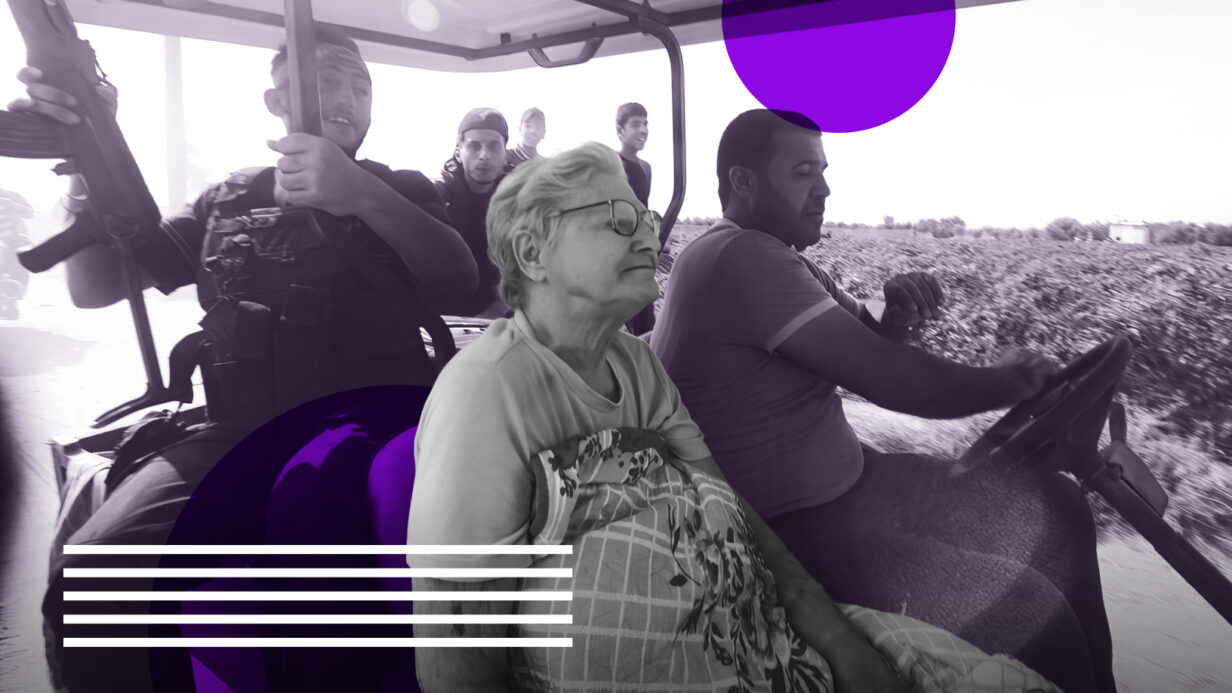
Kfar Aza, Beeri, Nahal Oz, Nir Oz, Alumim, Reim Kisufim, Ein Shlosha, Sufa, Ofakim, Sderot, Netivot — the names of these kibbutzim and small towns in the south of Israel will forever go down in the history of world terrorism. On October 7, 2023, between one thousand and two thousand militants in 20 places broke through the border from the Gaza Strip and invaded Israel. They attacked civilians, some of whom were killed, some were taken hostage into Gaza, and some were listed as missing.
The number of kidnapped Israelis whose identities have been identified has reached 210 today. Their families have been notified. But there is still no exact data on how many of the missing people are alive and how many were killed. Not all of the bodies found have yet been identified. The data is still changing, since a music festival was held near one of the kibbutzim, where participants from different countries gathered, and it has not yet been possible to determine the exact number of guests and residents at the time of the attack. In addition, the attack happened on a holiday weekend, when many Israelis were visiting their relatives on kibbutzim. This also complicates the counting of people who could become victims of militants. Also, the search for the missing is complicated by the fact that operations to eliminate terrorists are still ongoing in southern Israel. Therefore, it is impossible to conduct a large-scale search campaign where fighting is taking place. But small volunteer groups began work on the second day after the tragedy.
Among them was Alexandra Panyutina. A new immigrant, she arrived in Israel just six months ago. Alexandra is a zoologist by profession, studying the structure and movement of animals. Three months ago I started working at Tel Aviv University in a laboratory for the study of bats. To search for those who, fleeing bullets and captivity, fled towards the thickets, gardens and forests surrounding the kibbutzim, she decided to use field equipment that she used on scientific expeditions. At the request of T-invariant Alexandra tried to reconstruct the picture of the tragedy that occurred.
The material is also available as a podcast.
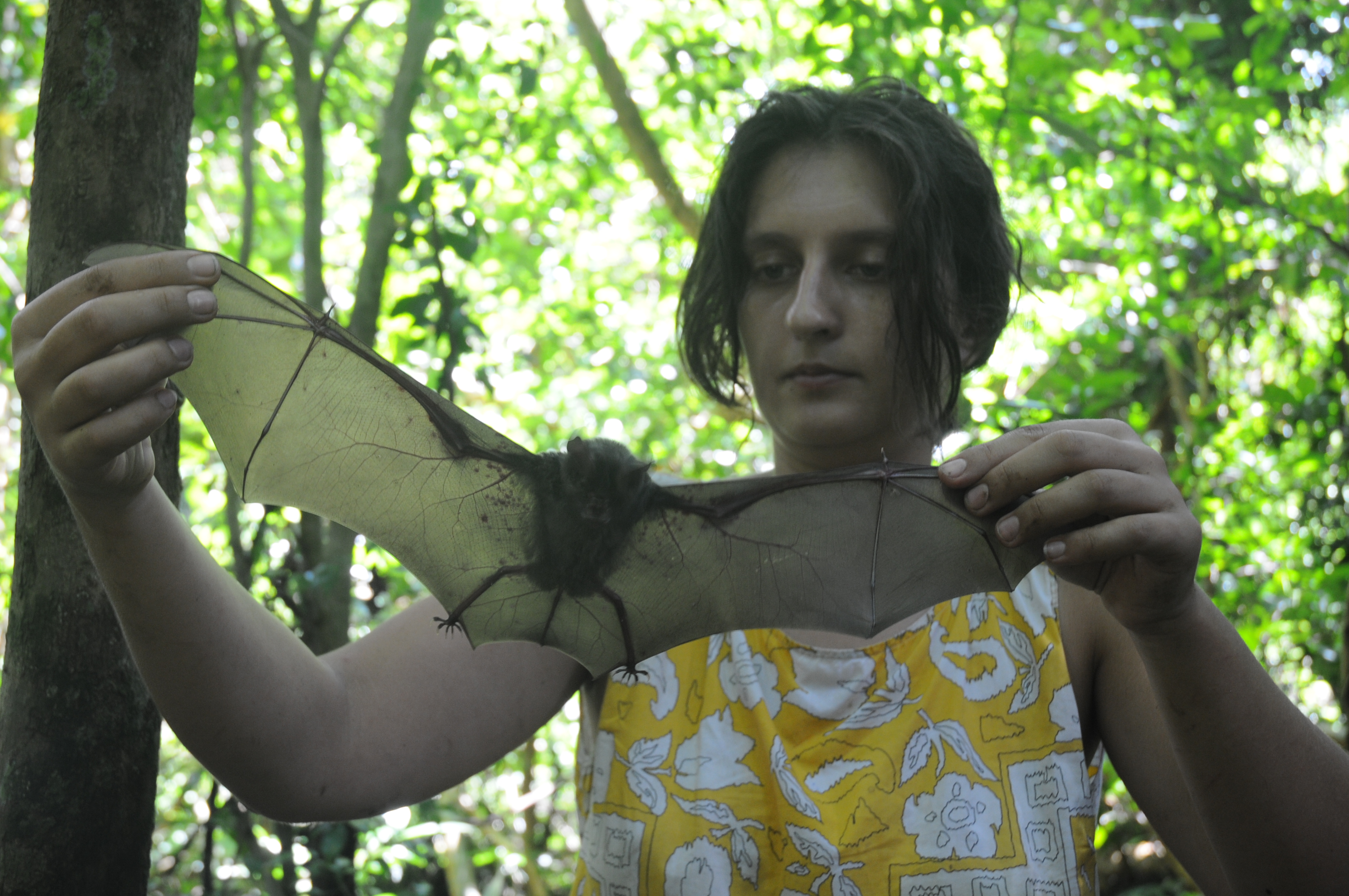
Photo from Alexandra’s personal archive
— Sasha, how did you get into the search party?
— My colleague and good friend, with whom we once worked in Russia, and now he lives in Israel in the center of the country, wrote to me on October 8 that he was near Sderot and trying to get further south to start looking for those who were able to survive escaping from the festival. He trains dogs and has organized with the Israeli Kennel Club to go there. I immediately asked if there was anything I could do to help. I don’t have a dog, but I have a passable car, some equipment for field work and, most importantly, the skills to work in nature, since I am, after all, a field zoologist by training. That’s how another colleague and I ended up in this group.
We took a long time to get there, because it was impossible to get through the direct and shortest route. We ended up driving through Netivot, through the suburban fields. As it turned out later, this was one of the most dangerous zones where we should not have been. But, nevertheless, we safely reached Beeri, and already in the Beeri area we met with the group that was engaged in the search.
— How did you understand where to look, who to look for? Did you know how many people were missing and how many people needed to be looked for? After all, the nature of the actions actually depends on this. When searching for one or two people, one search algorithm is used. When they are looking for a large group — another. What information did you use?
— There was just a problem with the information. The fact is that we immediately realized that we should not concentrate on finding people from the kibbutzim, since most of them died in their homes. And if someone remained alive, then he was in his home, and there they could be found much better by surviving neighbors, the kibbutz security service, and the army. We weren’t needed there. And we need to look for the festival participants who were running away through the fields. Actually,Hamas posted footage of these people being driven through the fields.We understood that quite a large number of people could have escaped somewhere in the shetach, as they call it in Israel, that is, in nature. And these people may still be there.
We also knew that at this moment the army had not yet searched for survivors. On October 9, there were still areas where terrorists were located. And, accordingly, the priority task was to clear this entire territory of terrorists. That is, no one was specifically looking for people. There was neither time nor energy for this. And, most importantly, these tasks: searching for terrorists and searching for people — slightly contradict each other. Therefore, the military did not specifically search for people, and we hoped, thanks to the dogs and thanks to our field skills, to have time to help those who were still hiding and could survive this attack.
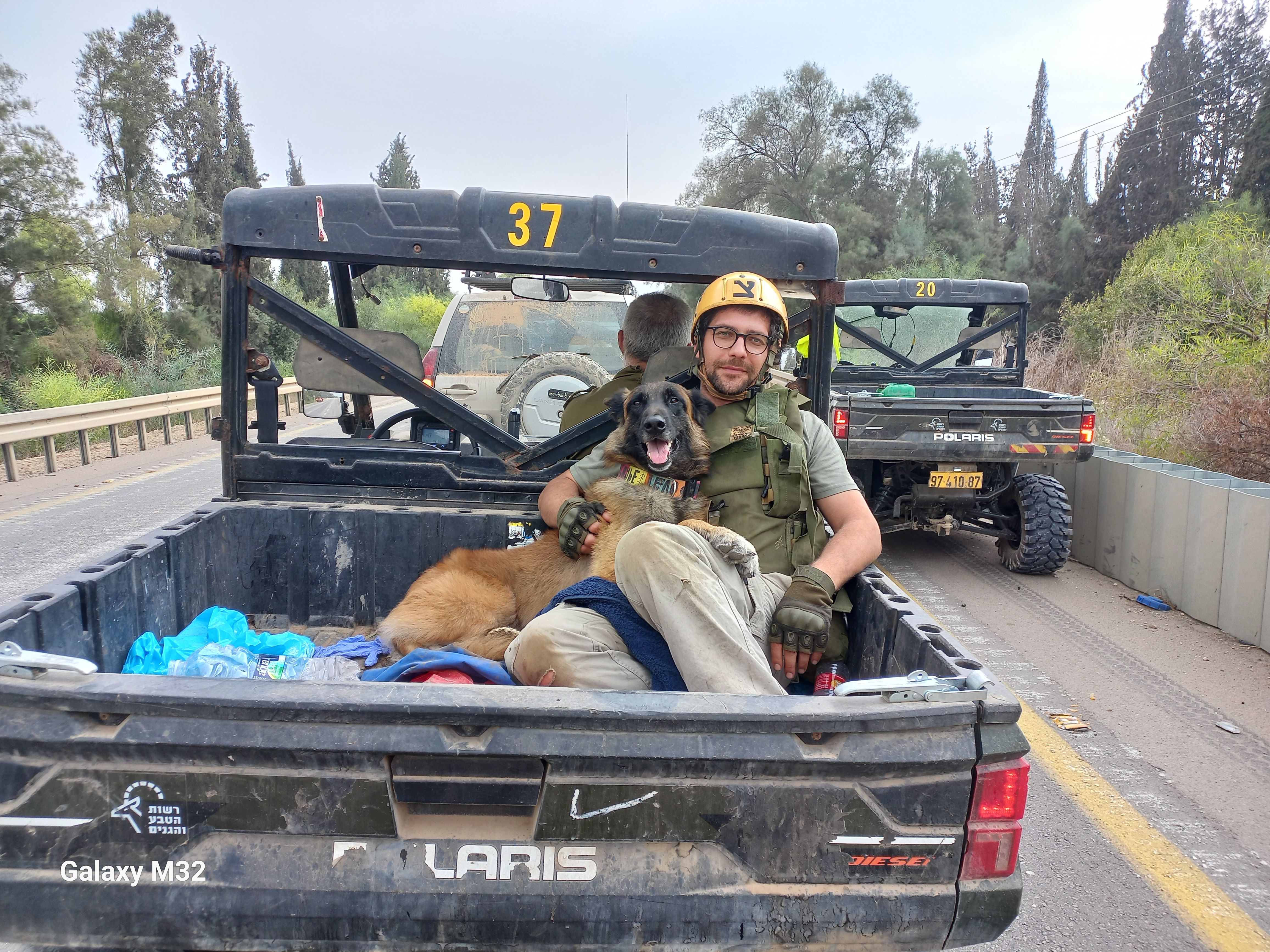
Photo from Alexandra’s personal archive
One of the main problems was the lack of information. There is a chat in which relatives of the disappeared write some information about these people. This information was collected at the headquarters of the search group. And our first tasks were to try to check certain points, for example, places where the phone locations of one of the missing people were detected. Then we tried to switch and work in a different way. We sent our colleagues in Russia footage made by Hamas, where, in fact, people are being driven across the field. They were geolocated there. And we decided to work the streams along this field in the hope that, in fact, the only way out of the field in which it was possible to survive was to get into these streams and further along their beds to find shelter and hide somewhere.
But the main problem was that we didn’t really understand what order of people we were talking about. We are looking for one or two people or we are looking for 200 people — no one knew or could say. And, in fact, as I understand it, none of those involved in volunteer work still have such data.
Most likely, many of the missing people who are now being sought will be subsequently identified. That is, they are no longer alive. But, nevertheless, a certain number of people may have been saved. And here’s some good news: seven days after the tragedy, they managed to find one living girl who was hiding in a stream in a cave. And she didn’t come out because she thought that Israel had been captured. And she learned that Israel was not captured from the search engines who found her.
— Describe the beginning of the search.
— First of all, when we arrived, we saw the road between one of the most damaged kibbutzim — Beeri — and kibbutz Reim. Right in the middle of this road, between the kibbutzim, the festival was taking place — there was a parking lot there. Firstly, we saw that this road was all burnt, there were traces of the remains of cars burning there. There were cars in the parking lot.
— A lot?
— Just a countless number: there are many, many, many of them under the trees. Those who could not even try to leave, those who apparently died on the spot or who tried to escape on foot. Some cars are very badly damaged, some are completely intact.
— So, the terrorists blew up some cars, set them on fire, and left some?
— Well, basically it was in this parking lot that they were most likely shot. But, apparently, due to the fact that many people tried to run, someone simply crashed into someone else. That is, I didn’t see any traces of missiles there. It seems to me that there are no signs of shelling in this area. But they set something on fire — yes, and obviously cars were burning on the road, because traces of these burnt cars remained on the asphalt. And along the road there are a lot of cars that burned out. That is, apparently, they were set on fire later, killing those who were in them.
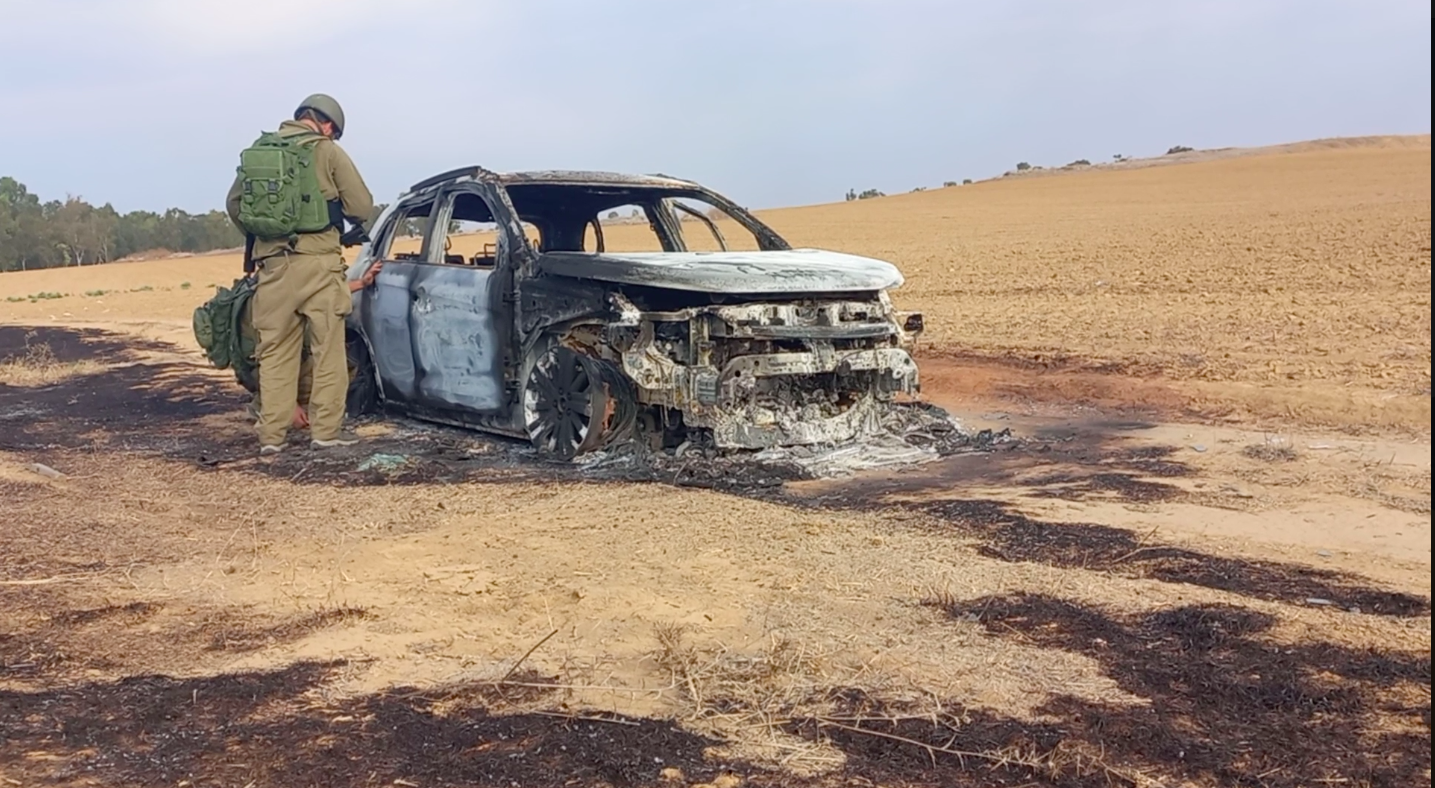
Photo from Alexandra’s personal archive
—Have you personally seen the bodies of dead people in these cars?
— When we arrived, work was underway to extract the bodies. There is a special group in Israel, ZAKA, which is engaged in identification, collection of bodies, and so on. And so they worked in Beeri that day and the following days. By the time we arrived, the bulk of the bodies had already been collected, but there were places where this was not so easy to do, since not all the bodies were complete and in a state in which they could be identified as bodies. I think that they are still doing this in kibbutzim.
— Were there many bodies that could not be identified by appearance and that would require identification by DNA?
— I can only judge from the words of the people who were involved in collecting the bodies: yes, there are big problems with identification. At least in kibbutzim Beeri, Nahal Oz, Alumim there were a lot of unknowable bodies. We spoke with a military manabout the search for girls who ran away from one kibbutz to another. We were going to search between these kibbutzim and try to find someone, since it is known that they have not yet been found. And the military man said that it is more likely that they all died in the kibbutz where they expected to find help, and he believes that they are all among the unidentified bodies.
— Were they burned alive or killed first?
— As far as I understand, there is no answer to this question yet and it will be answered.
—Your task was to find the living while it was still possible. Where are you headed?
— We immediately rejected the idea of working in the fields, because the fields there are now clearly visible: there are practically no thickets there. Therefore, we were interested in streams, dry streams (now they are all without water), which border the fields and separate them, they have a lot of shelters.
On the first day we practiced other tasks, mainly signals from phones that we received from relatives. Quite unsuccessfully, we combed several areas of the area, trying to find, say, the third person who had disappeared from the car where the corpses were found, but one was missing. But in order to search further in this direction, we needed to get into the closed area of the gardens, where the army did not let us in that day. And we decided to try to focus on these streams. There were four of us working with one service dog. The task was to walk in a chain; our group was just enough to view the territory from both banks of the stream and in the center. And we worked on difficult places with the dog, so that she would go through bushes that a person could not normally enter, and try to find some people there.
—What did you find?
— We found traces of a hunt. That is, in these streams there were things that running people threw: a jacket, a sweater, a child’s coat, a bottle, glasses.
It was clear that people did not return for them because they were in a hurry to run away. Somewhere we found signs that people were hiding there. For example, there was a parking lot under the tamarisk bushes, where the remains of food lay, apparently someone took a rest. But mostly we saw signs of people running and being chased. So, about three kilometers from the edge of the field there was an abandoned car, on which there were no signs of execution. So that’s not why she stopped. But in front of her was the track of an ATV. That is, it looks very much like they simply caught up with this car and stopped it by driving in front of it.
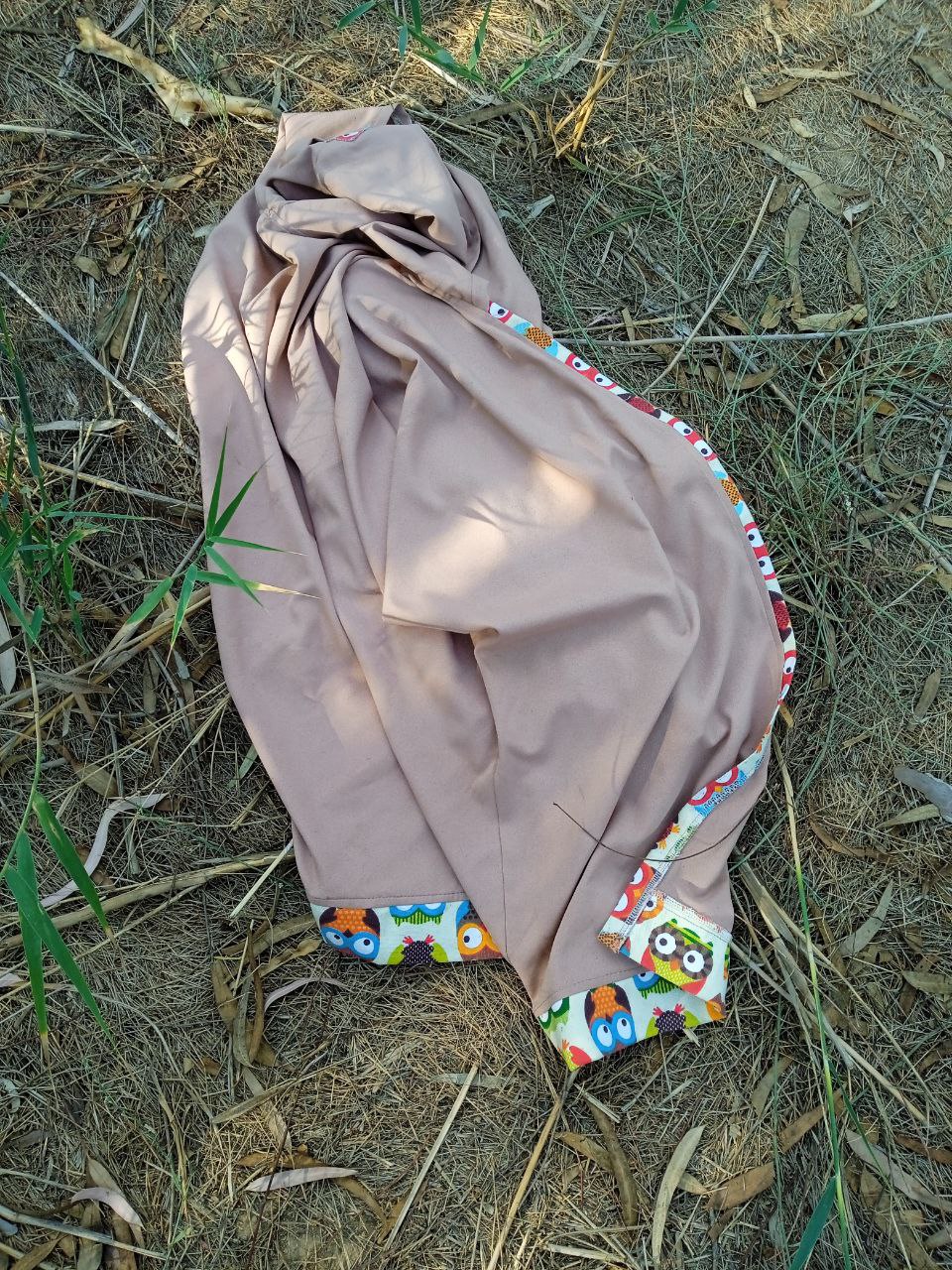
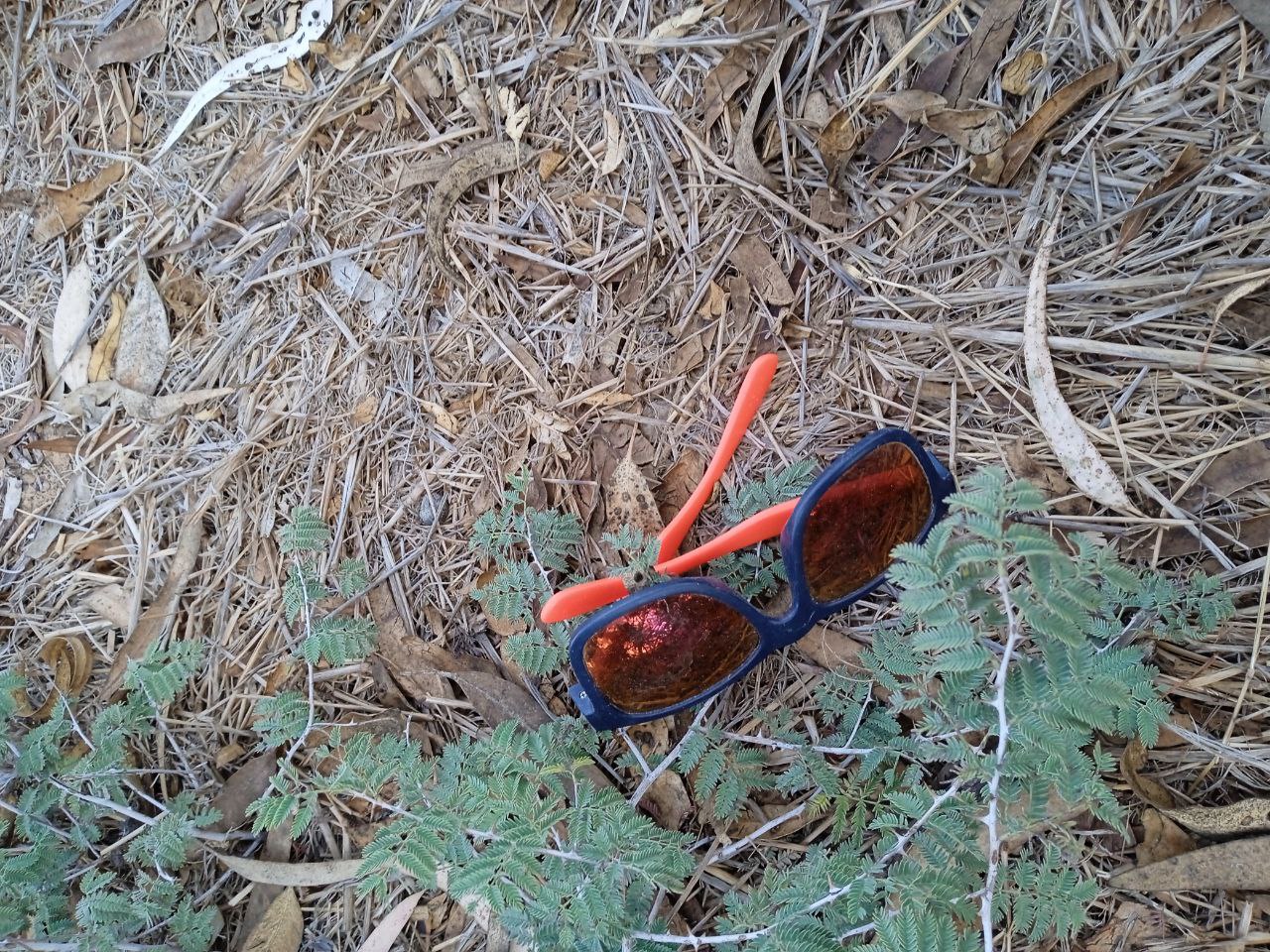
Photo from Alexandra’s personal archive
— Does this mean that the people from this car were taken hostage?
— Yes, with a high probability they were stolen. Then we walked about another kilometer and a half and found a car that stopped on its own. And unlike the first one, she showed no signs of being stopped. There were children’s things in this car. That is, it is obvious that there was someone adult and children there. And we began to search intensively, because there were just good thickets nearby, and we really hoped that maybe these people were there, since there were also no traces of blood and there were no signs that they had been caught up (there were no traces nearby other cars), we really hoped that maybe these people were still hiding. Well, that is, they are hiding somewhere here, and they are alive. And we walked back along the stream first and found several things. For example, a child’s coat is so light and colored glasses for a child of ten years old. And a fresh water bottle. That is, these are clearly things from just these days and it’s obvious that people were in a hurry, because, well, the things were lying so that they didn’t even try to pick them up. And then, in the reeds, my colleague with the dog, he discovered a hiding place in which lay a small baby bottle with the remains of water. So people were hiding there.
— What could be the fate of those people who were hiding and where could they end up?
— I hope that in this particular case fate was successful, because from the army post, which stood somewhere one and a half to two kilometers from this point, we found out that A father and two girls came out of this stream some time ago. And we really hope that we found their traces and that they escaped.
— But this is the fate of those who lingered. And those who did not hide in streams?
— I believe that those people who lingered, who hid, had a greater chance of saving their lives. Because Most of those who immediately went to other populated areas, for example, to a police post or to another kibbutz, died. They did not know that all the nearby kibbutzim were also captured, so there was no point in going there.
— People fled from one kibbutz to another, thinking that they would find help there, but ended up again with terrorists?
— That’s the point… It’s just that no one knew that there was no point in running there, but that they had to hide. And since we know that there was a battle in Netivot, those people who came out to Netivot immediately, they could very likely become victims. As far as I know, that group of people who came to Netivot just along the road along which we arrived, they came out much later. She came out in the evening, when the army was there and at least there was some kind of protection. And those who left in the morning, who ran straight away, they most likely ended up falling back into the hands of terrorists.
And we already know many such stories when people called their relatives and said: “We escaped, we are running home!”, Then they were actually shot in front of their relatives. Relatives heard on the phone how their loved ones were dying. That is, it was a real hunt (The video on the link was published by a channel that supports Hamas. We are sharing this video, because we consider it important evidence of Hamas crimes. The events recorded on it were geolocated. — T-invariant)
Moreover, hunting was not only in cities, not only in kibbutzim, but it was a real hunt through the forest, across the field, everywhere. There was no protection from them anywhere. And this whole shetah was filled with hunters who were chasing. And the expectation that you will find shelter among the trees — for most people it did not come true.
— Sasha, you are a field zoologist, you know what an expedition in the forest is. How would you compare the conditions in the forest of the Central Russian strip and in the forest that you just saw? How realistic is it to be saved in it? What’s the difference?
— Yes, in Russia I more than once had to think about what to do if I had to run away from the security forces. And I knew that in our forest I could always hide, I understood how to survive in it for a long time. And here, of course, the conditions are very bad in this regard.
—What is special about this forest?
— The fact is that this is not a forest. In essence, it is simply sparse shrub and tree vegetation that does not form closed spaces. And I looked through the trees, trying to figure out how to hide in them. Because if I found myself in such a situation in the Central European zone, then the safest place when they are chasing you, in my opinion, would be the crowns of trees. And I looked through different shelters that could be made in the trees.
And I didn’t find a single tree on which it seemed rational to hide. That is, everything is visible so well that any person who is pursuing you, if he has already gone there, he will definitely find you there.
Another thing is that in some places of these streams there are reed thickets. This in itself is a bad shelter, because when you sneak into them, you leave traces, especially since it’s autumn and everything is dry. At this time of year it is impossible to disturb the cover there and immediately restore it behind you. But there were a huge number of animal trails from wild boars, foxes, and jackals. And I think the best shelter is to use these animal trails to climb deep into the reeds along one of them.
—You searched for four days. In Israel it is hot in the fall, even more like summer from the point of view of a European person, the temperature is about 28-30 degrees Celsius, the streams are still empty, there is no water around. Who had a better chance of surviving and being saved in such conditions?
— Well, firstly, those who had a backpack with food and water at hand. For those who did not have supplies, on the fifth day, in my opinion, there was already little chance of surviving in such weather conditions. Another thing is that for at least two of the nights that we were there, it rained lightly at night, and a person with minimal field experience could have guessed to at least try to collect water.
— But in Israel quite a lot of people have this experience. These are trained people who have been through the army.
— Yes, and this just increased hope. And the main thing is that, apparently, it was precisely because of this that there were quite a lot of people who came out on their own. Precisely because people here have completely different field experience than, say, in Russia. Because in Russia many people lost in the wild cannot determine the direction to but move, and are simply afraid to go. They sit down and wait for help. And the Israelis explained to me: no one will wait for anything, we will go, we will do something, but we will not sit. And, on the one hand, thanks to this, people themselves were saved. On the other hand, I am afraid that thanks to this, many died, because they were saved too early. They came out of hiding too early.
— Among those who searched, did you meet relatives of the missing?
— Yes, at one of the points where we were looking, we met civilians. At first I couldn’t understand how they ended up there, because it seems the army doesn’t let anyone in and only people who are somehow connected with search operations work there. But it turned out that this was the father of the young man who disappeared, and his relatives found his phone in this area. And we were sent there, to this point, precisely to this telephone signal. We worked with him for two hours. We were given several soldiers who went with us both as search officers and as security, since this was a zone where there could still be terrorists. And, probably, the most difficult thing at that moment was to persuade this father to walk in chains. Because he hoped so much to find his son that he kept stopping at every bush and shouting: “Yuda, Yuda!” And it was clear how hard it was for him and how much he still did not lose hope, he believed that under this bush, under which you look through everything and see that there is no one there, he still thinks that maybe now his son will respond from there.
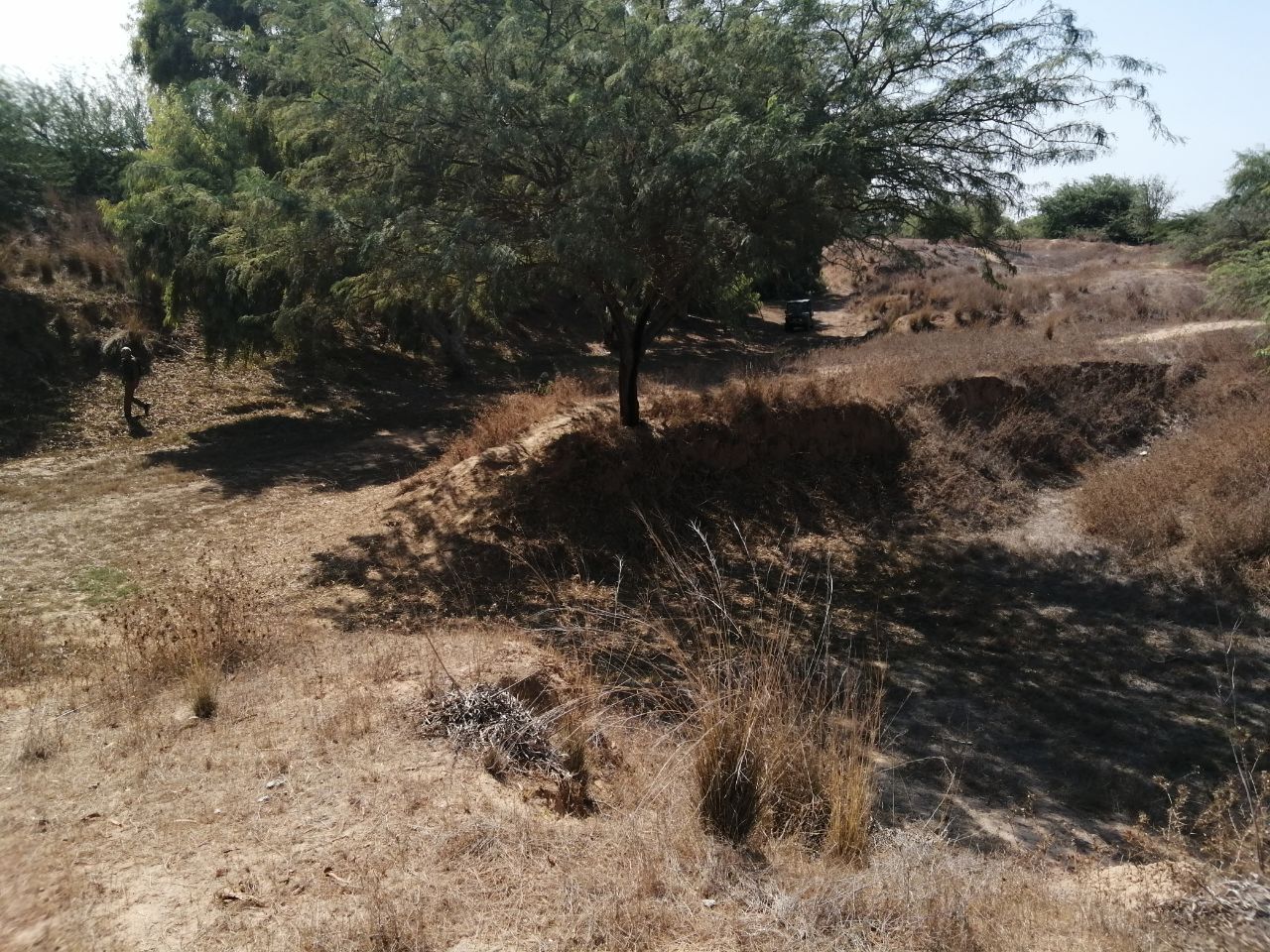
Photo from Alexandra’s personal archive
The hardest thing was that we were removed from this point and sent to another task, since the military had to leave, and we were not allowed to remain alone in this territory. And we found a chain of human traces that no one had checked yet. And I also thought that perhaps these were traces of his son, if indeed there was a telephone there. And we could track them down, that would be a chance. So the next morning I persuaded one of the Israelis, who had previously served in the IDF, to go there. He arrived in the south almost immediately, as the operation to liberate Israel began, and fought alongside his former army colleagues. He obtained weapons from one of the wounded and helped liberate one of the kibbutzim. Then he switched to search work. We agreed to return and try to trace those tracks. But in the morning, when we arrived, it turned out that this entire trail was clogged with sheep. Fully. And there are no more traces. We moved approximately in the direction where these missing tracks could lead and drove out to a farm. The owner said that he saw the terrorists, but did not meet those fleeing the pursuit. And since he was a Jew and there were many buildings on his farm where he could hide, he could help. But no one came to him. Then we have completed this part of the search.
And then we met with Yuda’s father on the very last day of the operation. He came to the military unit where our search group was based and said that his second son was able to obtain a duplicate SIM card of the missing person and hack the GPS of that phone. And, although my son’s phone is turned off, it still sends a GPS signal every once in a while so that he can be found. He showed a point that was five kilometers from us. And there were about 20 minutes left before sunset and it was clear that we couldn’t get into the area where this phone was located, if it was really there. Firstly, no one will let us there. Secondly, there was a high probability that this was an ambush and the phone was in the hands of terrorists. It was already known by that time that many terrorists, having taken the phones of their victims, sent messages from them, sent videos to relatives of the murder of their loved ones, and posted it on social networks. What was especially alarming was that the point was moving in the direction of Gaza. However, there was still a chance that a disoriented person could move like this. The father said that the missing son did not serve in the army, i.e. he did not have good training.
— So he could have gotten lost?
— Yes, firstly, he could get lost, and secondly, he could simply be in shock and move chaotically. And judging by the distance from the point where we were looking for him two days before, if he moved very slowly, say, fell, then got up, then it was very similar to the distance that a disoriented person in poor physical condition could walk. Then we tried to break through the checkpoint in order to still get closer to this place. I had an idea to launch a quadcopter from the road.
— Did you have a quadcopter with you that you used before in your field research?
— Yes, of course. I used I used it to watch animals, it’s a very amateur device that can fly for 30 minutes. Usually no one launches it for more than two kilometers. But since the military did not let us through and the sun was already setting, then I finally decided to launch from the base. Imagine, if there is a living person there and his father is here, looking at me as the last hope, I simply cannot do otherwise. And in fact, I felt guilty for not checking those tracks right away, for not telling the elder in our group on the very first day that we needed to stay and check the tracks…
— Which were then trampled by the sheep?
— Yes, which we lost because of this. I realized that I needed to do everything immediately to find my son. If he moves in that direction a little more, he will either be shot by his own, the Israelis, or he will end up with terrorists.
I tried to send a drone there, even filmed the area where the point was. And on the way back I didn’t have enough charge to cope with the wind. There was a very strong wind at the top, and as soon as I went lower, the drone lost contact and had to be raised. The GPS in that area did not work, meaning he could not return on his own. I had to raise it to maximum height to fly back, and there the wind kept it almost in place. He did not reach our base two kilometers and fell. But since I hoped that there was a recording on the flash drive and we would see if there were people there, if there was a person there, we spent several more hours trying to somehow get through there or negotiate with the military so that they would take the drone. Well, then news came from my father that the body was identified in Beeri.
— So all this time you were looking for a person who was dead and whose phone was in the hands of the terrorists?
— That’s what we thought then. Although now I have some doubts. The thing is that my GPS was jumping there all the time…
— Yes, and here, in the north of Israel, where we are now, there is a problem with navigation. GPS practically does not work for several days.
— And now I think that perhaps the phone was in one place all this time. That is, terrorists could have taken it and thrown it away. But since the signal was jumping all the time, there was a feeling that the person was moving. Therefore, maybe, yes, a terrorist left with him. Or maybe he was just lying in one place all this time, and the relatives saw the illusion of movement and hoped to find the guy alive.
— What did you see that shocked you the most? What will you never forget?
— Hunting. Along the stream along which we walked and which was the most productive, and, as we now understand, we had to work and work in it further, at some point I saw a lot of cars at the top, on the cliff. At first I couldn’t understand what dozens of cars were doing there, because the festival parking lot was on the other side of the road, about five hundred meters away.
And when we approached this place, I realized that this was not a parking lot… This was a cemetery… It was not difficult to reconstruct the picture of what happened. People drove through the field as short as possible, since the road at that moment was under fire and no one was driving along it. And the people decided that the safest thing was to run across the field, as there was less chance of being caught. But most of the cars were front-wheel drive, not all-wheel drive, they got stuck in the furrows one after another, colliding, trying to get around each other. So they fell into a trap, where they died.
Here are also those avocado gardens that we didn’t get to on the first day. The fact is that when we searched the side of the road, we found three places where the fence wire was broken. We checked, it really wasn’t very difficult to tear it apart with your hands. Where the sections joined. And it was clear that someone had crawled into these holes. Our colleague and his dog got there a day later. He walked to the opposite border of the gardens. And there I discovered things. Things and traces of the fact that they caught up with those running… These people did not have time to overcome another barrier…
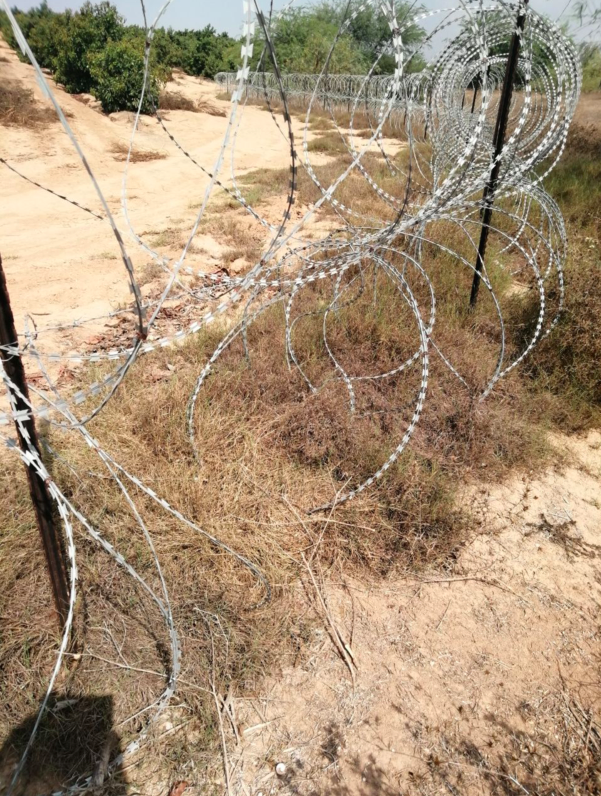
Photo taken from Alexandra’s personal archive
— How did you understand that you had to end your search?
— Based on the weather: temperature and lack of water. We did some math and realized that Wednesday, October 13, is more or less the last day when it makes sense to look for the living. But since we were unable to further examine on Wednesday those places that seemed to us the most promising, and on Thursday we managed to get there without hindrance, we decided to continue working. And it seemed to us at that moment that it was no longer possible to survive. We ourselves, taking with us quite large supplies of waters, by the end of the day they were completely spent. And the dog was very tired and practically could no longer work. That is, she was completely exhausted. And we assessed the chances of those who escaped as zero. Because if a person did not come out himself during this time, did not give a sign, did not give any signal, he was either wounded and died from loss of blood, or he still had to somehow try to stick his head out and make himself known.
But we were wrong. Now that we know about the girl found… I really regret that we left, because maybe we could have done something else…
The problem is that since we are new Israelis, it was very difficult for our group to obtain any permits, go somewhere and explain what we could actually bring benefit. And it seemed to me that since the rest of the Israelis, who worked with us and knew how to negotiate on the ground, had finished their search, then we, too, could do nothing more. I really regret this now. I think that if we had worked for another day or two, perhaps we could have helped someone.
Text Olga Orlova